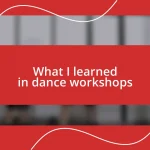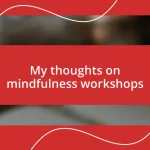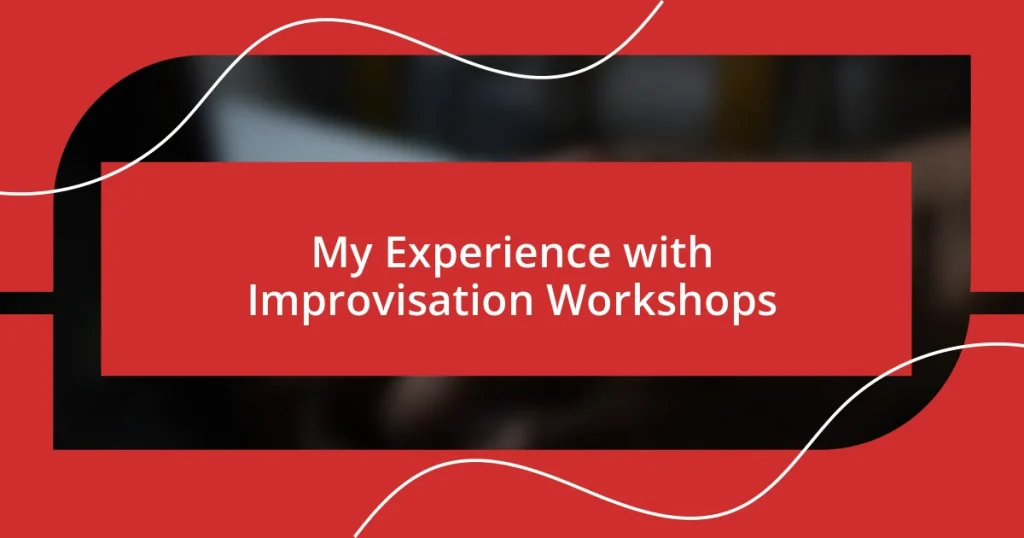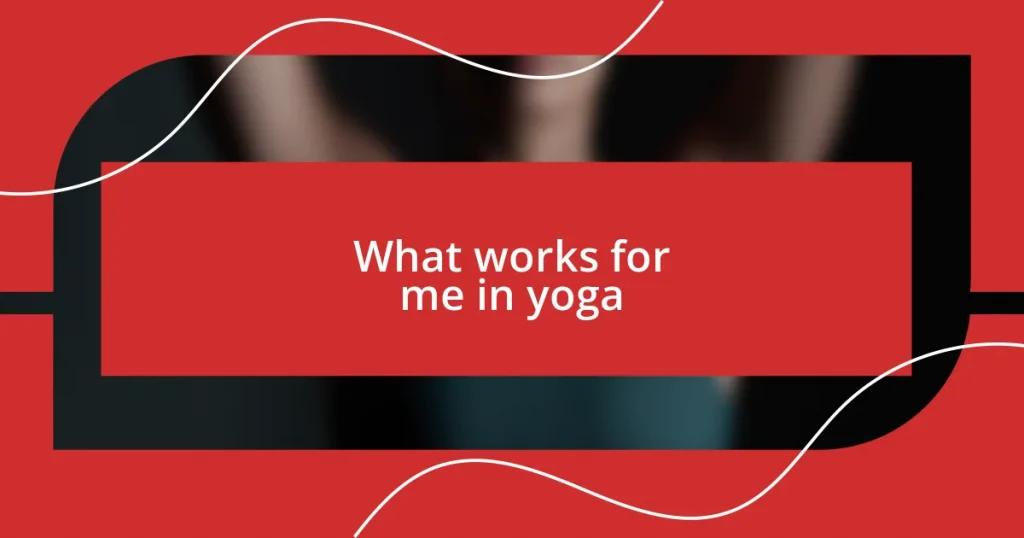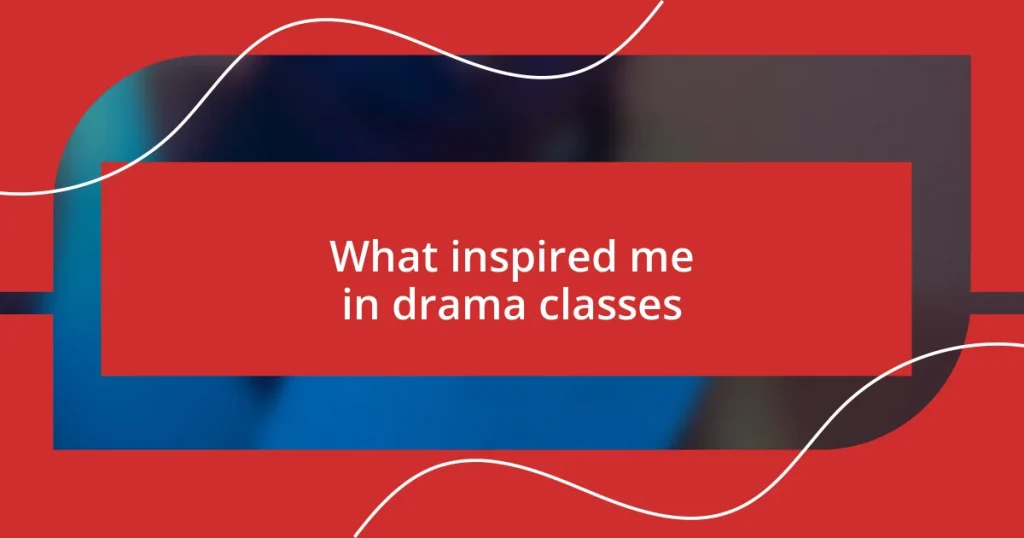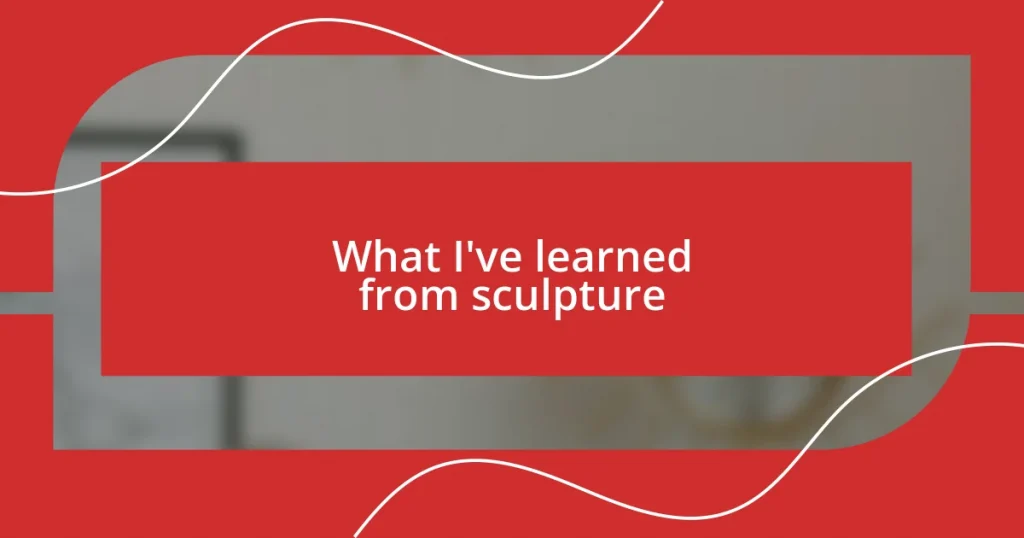Key takeaways:
- Improvisation workshops foster creativity and confidence through spontaneity, enabling participants to embrace vulnerability and authenticity.
- Key techniques learned include “Yes, And” for collaboration, character embodiment for deeper connections, and active listening to enhance engagement.
- Skills from workshops, like adaptability and embracing imperfections, can be effectively applied beyond the stage in personal and professional interactions.
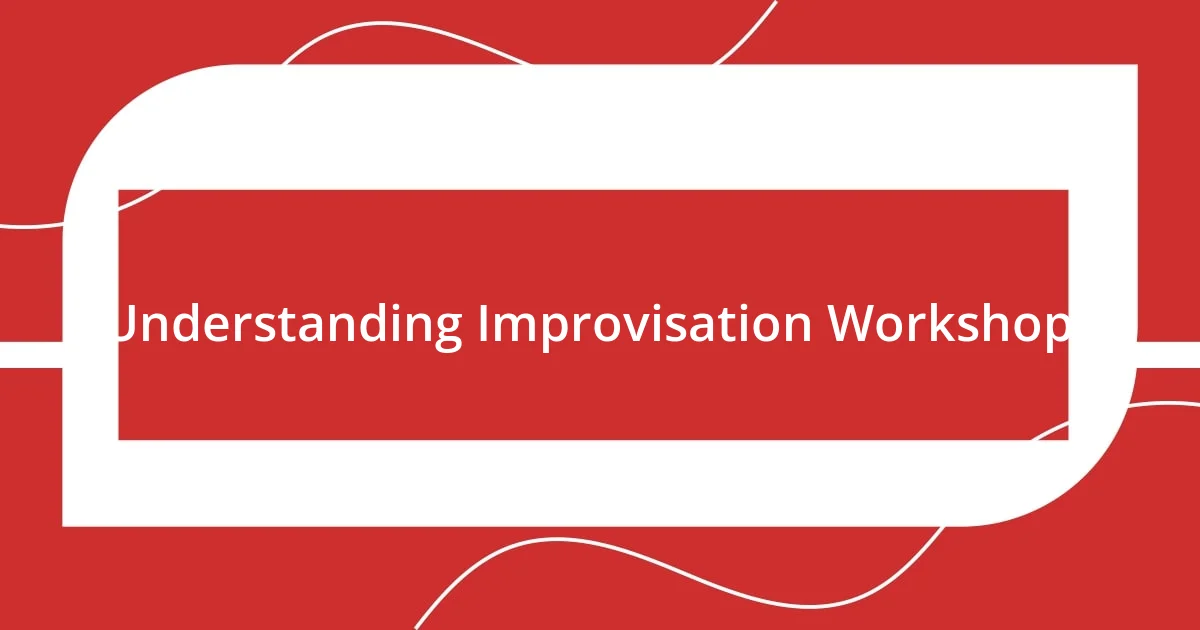
Understanding Improvisation Workshops
Improvisation workshops are unique spaces where creativity thrives without the constraints of scripts or rehearsals. I remember my first session vividly; we dived straight into games that challenged our instincts. The thrill of spontaneity was palpable, and it made me wonder: how often do we get to embrace our unfiltered selves in daily life?
In these workshops, participants learn to trust their intuition and communicate authentically. I often found that the more vulnerable I allowed myself to be, the deeper my connection with others grew. Have you ever experienced that rush of excitement when you take a leap of faith? It’s exhilarating, and it teaches us to embrace uncertainty as a crucial part of the creative process.
Moreover, the environment in an improvisation workshop is devoid of judgment, fostering both collaboration and personal growth. I recall a moment when I flubbed a line during a scene; instead of embarrassment, laughter erupted. That experience reminded me how essential it is to cultivate resilience and adaptability—not just in performance but in life itself. Isn’t it refreshing to think that we can learn valuable lessons while having fun?
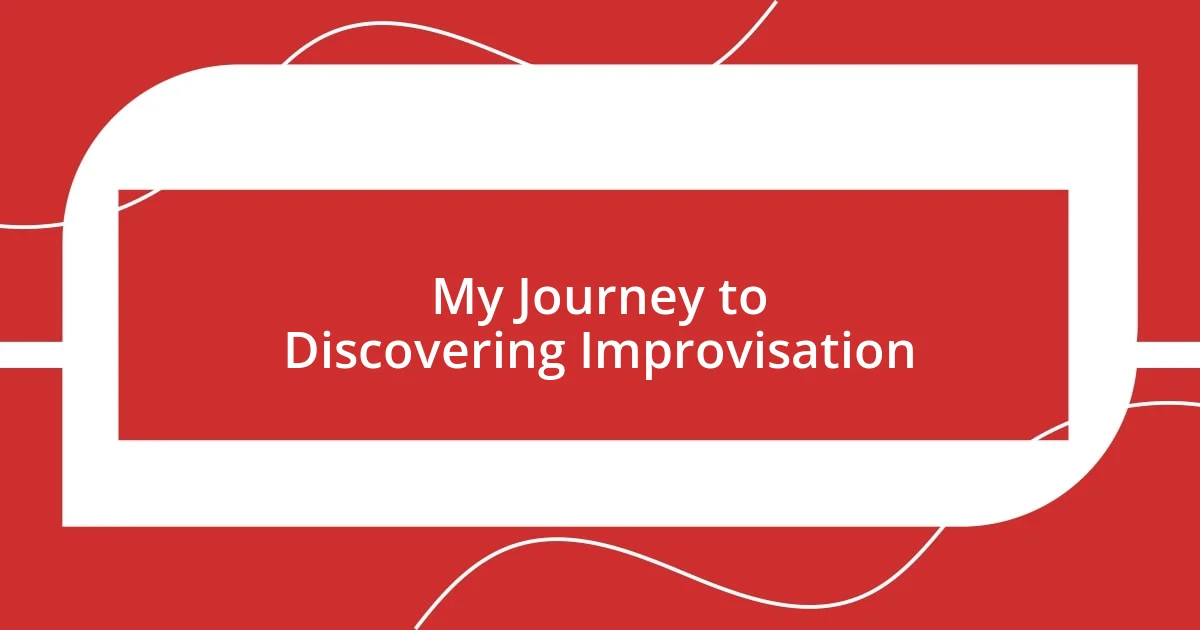
My Journey to Discovering Improvisation
My introduction to improvisation was more serendipitous than planned. I stumbled into a workshop during a community event, feeling hesitant but curious. As the first game unfolded, I felt a mix of nerves and excitement; it was like jumping off a diving board into the unknown.
The magic of that day hit me when we paired up for a scene. I collaborated with a complete stranger, and we ended up creating an absurdly hilarious narrative about a lost cat and an intergalactic space mission. I laughed so hard that tears rolled down my cheeks, and in that moment, I realized how freeing it was to let go of expectations and simply play. Doesn’t it often take moments of playfulness to unlock creativity within ourselves?
Reflecting on that initial workshop experience reveals how much it enriched my perspective on spontaneity. I learned that true creativity flourishes in the face of uncertainty. Engaging with others in that playful space of improvisation sparked a profound joy that I continue to chase. It’s incredible how something as simple as a game can transform your approach to life’s unpredictability.
| Emotion | Experience |
|---|---|
| Nervousness | First workshop felt daunting |
| Joy | Created silly stories with strangers |
| Freedom | Letting go of expectations |
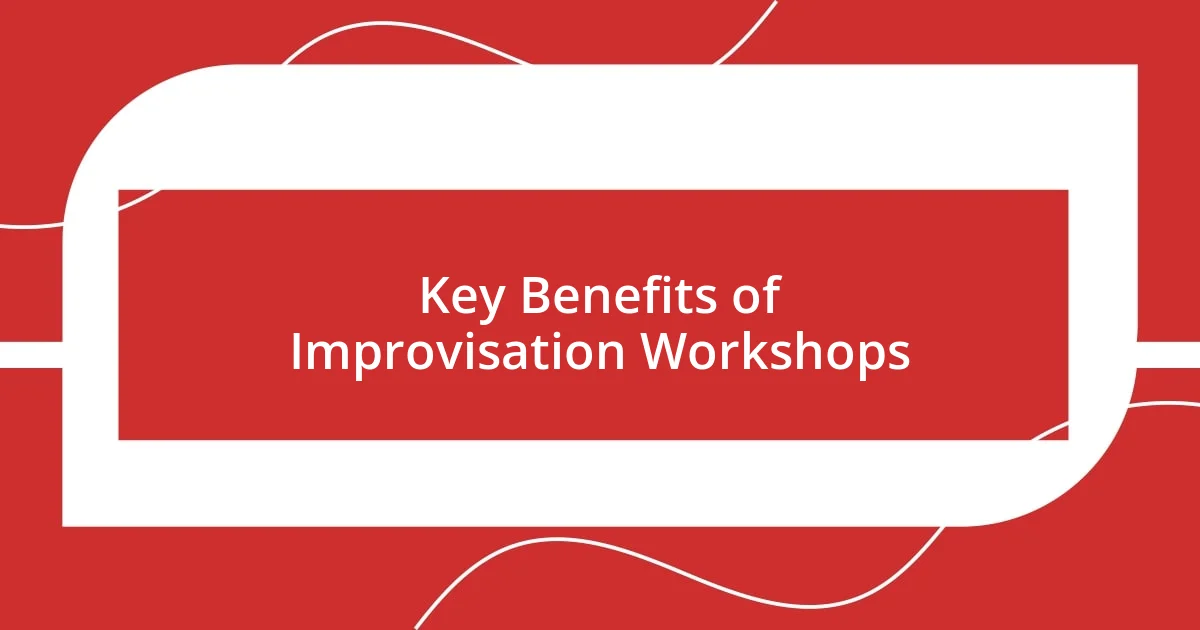
Key Benefits of Improvisation Workshops
Improvisation workshops offer a wealth of benefits that extend far beyond the stage or classroom. I can’t stress enough how these experiences can greatly enhance one’s confidence. For instance, during my early workshops, I vividly remember stepping onto the stage with a pounding heart. But as I embraced the moment, allowing myself to react spontaneously, I found a newfound self-assurance that spilled over into other aspects of my life. It’s as if each laugh and gasp from the audience fortified my ability to face challenges head-on.
Some key benefits of improvisation workshops include:
- Enhanced Communication Skills: The rapid-fire nature of improv forces you to think on your feet and respond authentically.
- Boosted Creativity: Engaging in spontaneous exercises ignites new ideas and approaches, pushing your creative boundaries.
- Increased Collaboration: Working with others fosters trust and camaraderie, strengthening interpersonal connections.
- Resilience Training: Learning to adapt allows for greater flexibility when encountering unexpected situations, both on stage and in life.
- Stress Reduction: The playful environment encourages laughter, which can be a wonderful stress reliever.
Every time I attend a workshop, I feel like I’m reminded of how much joy there is in embracing uncertainty. My mind races back to an exercise where we had to come up with a scene based solely on audience suggestions. I was surprised by how quickly I could snap out of my comfort zone, diving into bizarre scenarios that left everyone in stitches. These moments of humor and spontaneity not only cultivated resilience but also cemented my belief that stepping outside one’s familiar boundaries can reveal incredible personal strengths.
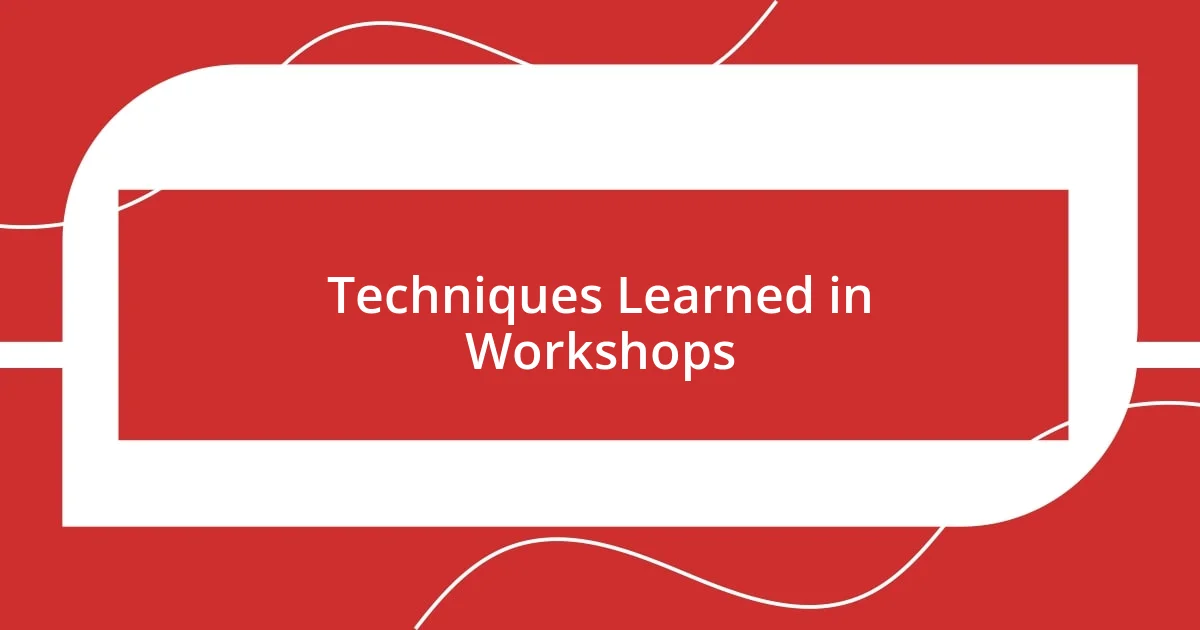
Techniques Learned in Workshops
One of the standout techniques I learned in the workshops was the power of “Yes, And.” This concept emphasizes accepting what your scene partner presents and building upon it. I remember a specific moment when a fellow participant introduced a wacky idea about a talking pineapple. Instead of questioning it, I jumped in and suggested we were in a fruit convention. The laughter that erupted showed me the magic of collaboration and trust in the unexpected. How often do we shy away from others’ ideas in everyday life? Embracing this principle can lead to surprising and delightful outcomes.
Another incredible technique that stuck with me is the art of character embodiment. In one workshop, we were encouraged to step into the shoes of a character and explore their quirks and mannerisms. I distinctly recall adopting the persona of a highly dramatic librarian who was obsessed with organizing her books by color. As I flailed about, dodging imaginary flying books, I felt an exhilarating sense of freedom. I realized that tapping into this playfulness can also help us connect more deeply with others. Have you ever found that pretending or role-playing allows you to express sides of yourself you’d otherwise keep hidden? It’s truly liberating.
Finally, I discovered the importance of listening, which might sound basic, but it’s incredibly profound in practice. I can still picture myself in a scene where I was so keen on showcasing my thoughts that I neglected my partner’s dialogue. The scene quickly fell flat. After receiving gentle feedback about the magic of active listening, my approach shifted dramatically. I learned that genuine engagement with what others say opens up a vibrant avenue of ideas and emotions. Isn’t it fascinating how mastering this simple technique can reshape not only performances but also our everyday conversations and relationships?
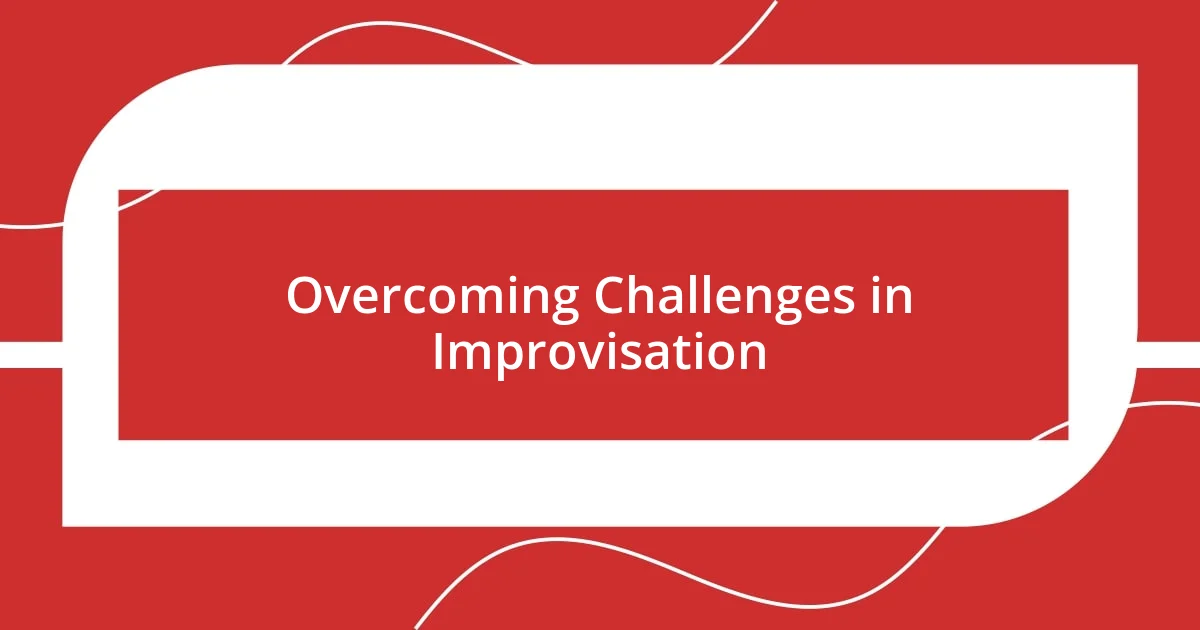
Overcoming Challenges in Improvisation
It’s essential to recognize that challenges in improvisation often stem from self-doubt and fear of failure. I remember feeling a wave of anxiety wash over me during a workshop exercise where we had to perform a scene without any prior preparation. The thought of embarrassing myself gripped me tightly. But as I leaned into the discomfort and let my instincts take over, I discovered a different side of courage—one born from vulnerability. This not only built my confidence but also fostered a sense of belonging within the group.
Another significant challenge is the unpredictability of working with others. I recall a time when my scene partner and I completely misaligned—our ideas clashed, and tensions rose. Instead of getting frustrated, I tried to embrace the chaos. I remember taking a deep breath and adjusting my approach by finding common ground and allowing humor to diffuse the situation. Have you ever had that moment when you surrender to spontaneity? The laughter that followed turned our awkward miscommunication into an unexpectedly hilarious scene, reinforcing my belief that adaptability is key in improvisational settings.
Lastly, there’s the struggle to let go of perfectionism. In the early workshops, I often found myself obsessed with getting every line right. I can still picture one particular scene where I stumbled over a word, feeling like I’d ruined everything. But just as I began to spiral, my fellow improvisers rallied around me, turning the blunder into a strength. It taught me that embracing imperfections not only humanizes our performances but also makes them relatable. In what ways do you hold back your authenticity for fear of imperfections? Allowing ourselves to be messy can create the most genuine connections with an audience and with each other.
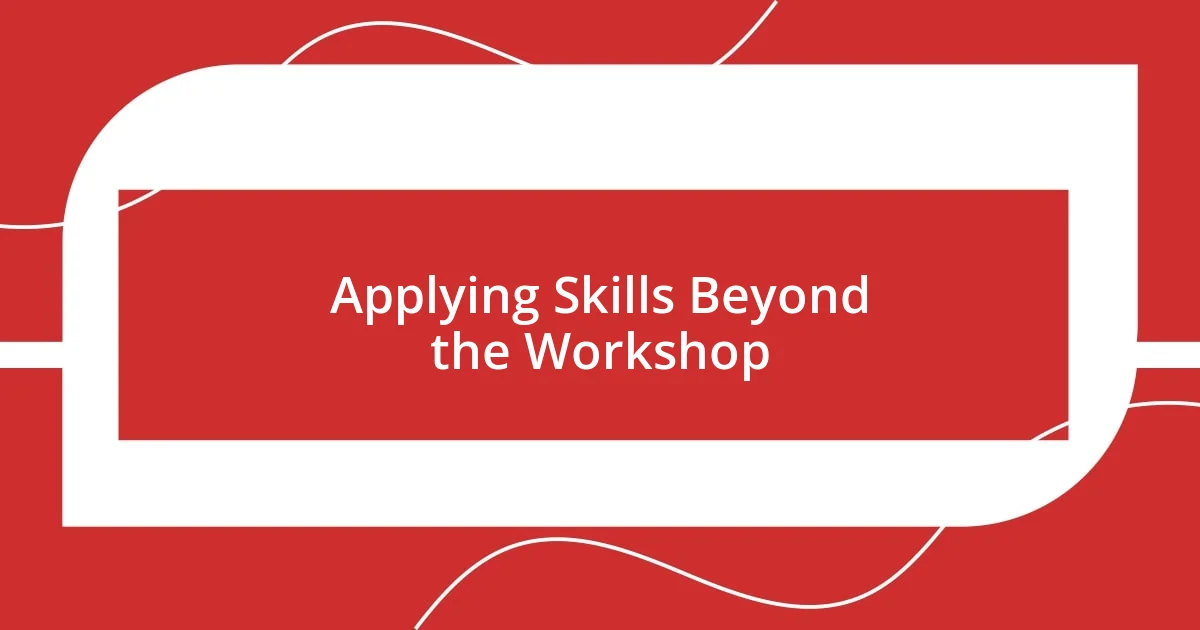
Applying Skills Beyond the Workshop
The skills I honed during those workshops extended far beyond the stage. For instance, I found myself utilizing the “Yes, And” principle in my workplace. When a colleague suggested a seemingly outlandish idea for a project, rather than dismissing it, I embraced it and added my thoughts. This simple shift in approach transformed our team’s dynamic and cultivated a culture of creativity. Isn’t it interesting how expressing acceptance can turn a stagnant discussion into a vibrant brainstorm?
Active listening, too, became a game changer for me. I started applying its principles during family gatherings where conversations often spiraled into a cacophony of overlapping voices. By genuinely focusing on what my loved ones were saying, I noticed deeper connections forming. I remember one dinner where my aunt shared a heartfelt story about her childhood. By truly listening, I not only understood her better but also felt an emotional bond grow stronger. Have you ever felt that a moment of active engagement can lead to a richer relationship?
Lastly, the realization that vulnerability is a strength has guided me in social situations. I recall a networking event where I nervously approached strangers, feeling the instinct to project confidence. Instead, I embraced my butterflies and shared my uncertainty about starting conversations. To my surprise, this honesty opened up a whole new level of connection with others. Many admitted they felt the same way! Why do we often think we need to appear perfect when our authentic selves can foster genuine relationships? Embracing vulnerability has truly enriched my interactions and made them more meaningful.






